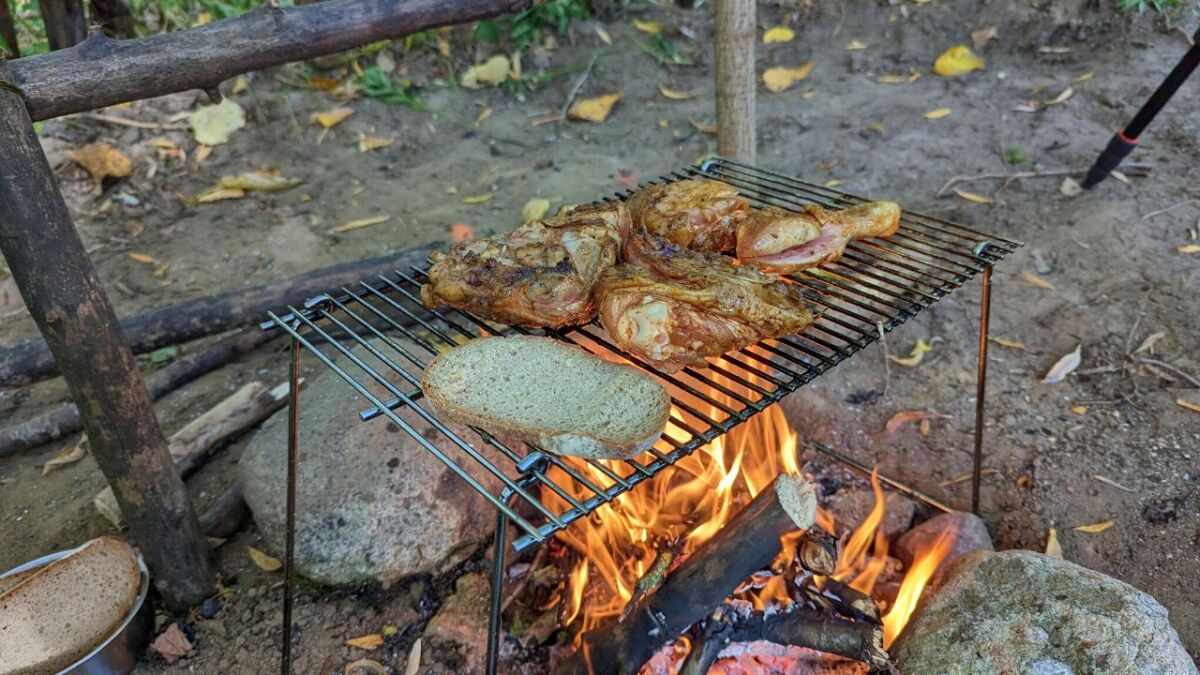
catering
Nomen
Meaning
Catering in the context of survival, bushcraft, wilderness, camping, and hiking refers to the preparation and provision of food and drinks in outdoor settings. It is an essential aspect of outdoor activities as it ensures that individuals have access to nourishment and hydration while away from traditional kitchen facilities. Catering in the outdoor realm involves planning and organizing meals, selecting appropriate cooking methods, and packing and carrying necessary food supplies. It is crucial to consider factors such as nutritional value, weight, and shelf life when catering for outdoor adventures. Proper catering enhances the overall experience and contributes to the success of survival and outdoor activities.

Examples
„I love going on wilderness adventures, but sometimes it's nice to have a break from cooking over an open fire. That's when I rely on my camping stove for catering delicious meals.“
„When I go on survival trips with my friends, we take turns catering for the group. It's important to plan and prepare meals that are nutritious and easy to cook in the wild.“
„During a recent bushcraft workshop, we learned about the importance of catering for different dietary needs. It's essential to consider allergies and food preferences when preparing meals for a group.“
„In the world of survival, catering for emergencies is crucial. Having a stockpile of non-perishable food items can make all the difference during a crisis.“
„As a wilderness guide, I often get asked about catering options for outdoor events. Whether it's a team-building retreat or a family gathering, I always recommend embracing the natural surroundings and incorporating local ingredients into the menu.“
Origin
The word "catering" originates from the Latin word "catera," which means "provisions" or "supplies." It has its roots in the practice of providing food and other necessities for travelers and soldiers in ancient times.
Over the centuries, catering has evolved into a specialized industry that involves the preparation and service of food and beverages for various events and occasions. It has become an essential part of social gatherings, corporate functions, weddings, and other celebrations.
In recent years, catering has also expanded to include dietary restrictions and preferences, such as vegetarian, vegan, gluten-free, and organic options. This evolution reflects the growing awareness and demand for diverse and customized food experiences.
Today, catering encompasses a wide range of services, including menu planning, food preparation, transportation, setup, and cleanup. It requires a combination of culinary skills, organizational abilities, and attention to detail to ensure a successful and memorable event.
Synonyms
Catering, Food service, Event catering, Banquet, Meal provision, Hospitality, Culinary services, Dining services
Antonyms
Customer, Guest, Client, Patron, Diner, Attendee, Visitor, Participant
Relatives
Food service, Event planning, Hospitality, Menu planning, Cooking, Catering industry, Catering business, Catering company
Historical and cultural importance
Catering has a long history and holds significant cultural relevance in various societies around the world. The concept of catering can be traced back to ancient civilizations, where feasts and banquets were organized to celebrate special occasions or honor important individuals.
In ancient Rome, for example, catering played a crucial role in social gatherings and events. Wealthy Romans would hire professional caterers known as "archimagiri" to prepare and serve elaborate meals to their guests. These catered feasts were seen as a symbol of wealth, power, and hospitality.
In medieval Europe, catering took on a different form. During grand royal events and noble banquets, skilled cooks and servants would prepare and serve extravagant meals to the guests. These feasts were not only about providing sustenance but also about showcasing the host's wealth and status.
Today, catering has evolved into a thriving industry that caters to various events and occasions. From weddings and corporate functions to parties and conferences, professional caterers are hired to provide delicious food and impeccable service. Catering has become an integral part of modern celebrations, allowing hosts to focus on other aspects of their event while leaving the food and beverage arrangements in the hands of experts.
Furthermore, catering has also become a way for individuals to explore and experience different cuisines and culinary traditions. Many catering companies specialize in specific types of cuisine, offering a diverse range of options to cater to different tastes and preferences.
In conclusion, catering has a rich historical and cultural significance, representing the art of providing food and hospitality to others. Whether it's a lavish banquet or a casual gathering, catering plays a vital role in creating memorable experiences for guests.
More information about the term catering
What is Catering?
Catering is a service that provides food and beverages for events, parties, and gatherings. It involves the preparation, delivery, and presentation of food to meet the specific needs and preferences of the clients. Whether it's a small intimate gathering or a large corporate event, catering ensures that guests are well-fed and satisfied.
The Role of a Caterer
A caterer plays a crucial role in making an event successful. They are responsible for planning the menu, sourcing ingredients, preparing the food, and serving it to the guests. A good caterer understands the importance of presentation and ensures that the food is not only delicious but also visually appealing.
Additionally, caterers are skilled in managing the logistics of an event. They coordinate with the event organizers to determine the number of guests, dietary restrictions, and any special requests. They also take care of setting up the food stations, arranging the buffet, and ensuring that everything runs smoothly during the event.
Types of Catering
Catering services can vary depending on the type of event and the client's preferences. Here are some common types of catering:
1. Corporate Catering
Corporate catering focuses on providing food for business events such as conferences, meetings, and seminars. The menu is often designed to accommodate a large number of guests and includes a variety of options to cater to different dietary needs.
2. Wedding Catering
Wedding catering is all about creating a memorable dining experience for the bride, groom, and their guests. The menu is usually customized to reflect the couple's preferences and can range from elegant sit-down dinners to buffet-style meals.
3. Social Event Catering
Social event catering covers a wide range of gatherings, including birthday parties, anniversaries, and family reunions. The menu can be tailored to suit the theme of the event and the preferences of the guests.
4. Food Truck Catering
Food truck catering has gained popularity in recent years. It offers a unique and casual dining experience, with food trucks serving a variety of cuisines at outdoor events, festivals, and street fairs.
The Importance of Catering in Survival Situations
While catering is often associated with celebratory events, it also plays a crucial role in survival situations. In emergency situations such as natural disasters or humanitarian crises, catering services are essential in providing food and nourishment to those in need.
Survival catering involves preparing and distributing meals to displaced individuals or communities. It requires efficient planning, resource management, and the ability to adapt to challenging circumstances. Caterers in survival situations often work closely with relief organizations to ensure that food is delivered promptly and meets the nutritional requirements of the affected population.
In conclusion, catering is a versatile service that goes beyond providing food for events. It encompasses various types of catering, each tailored to meet specific needs and preferences. Whether it's a wedding, corporate event, or survival situation, catering plays a vital role in ensuring that people are well-fed and taken care of.
Back to overview

